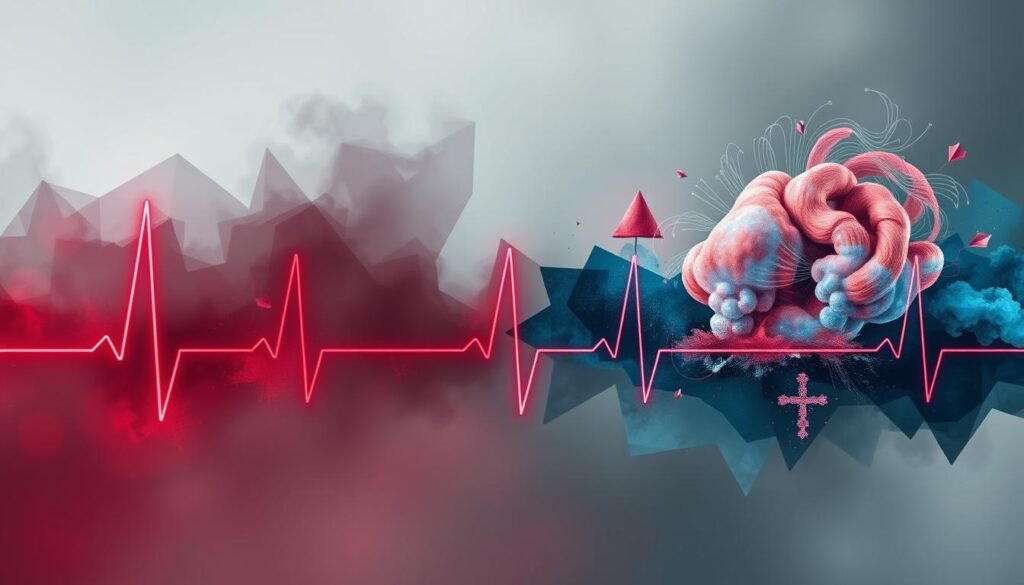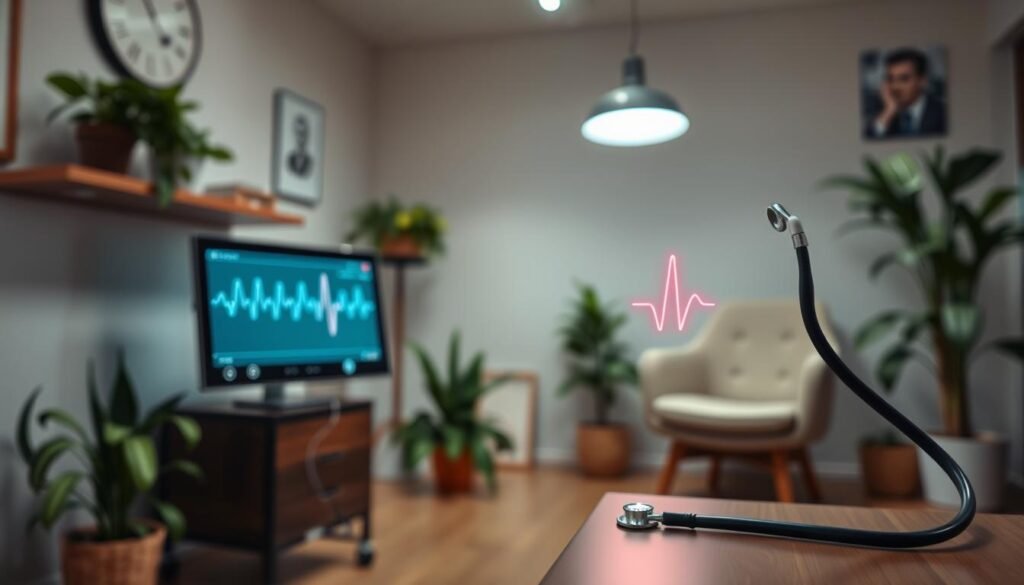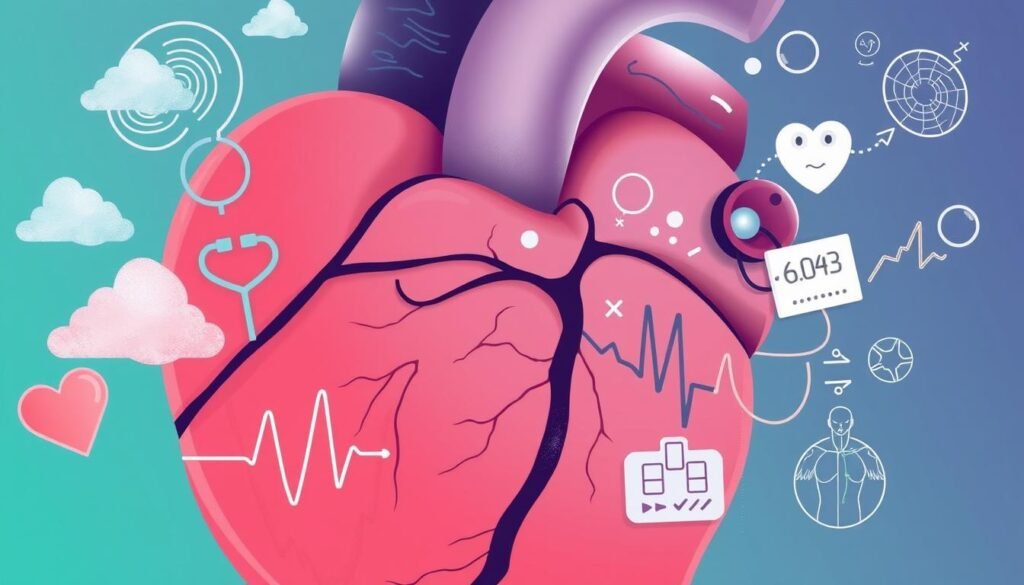Anxiety often causes heart palpitations, with no heart issues behind them. Believe it or not, around 20% of adults in the U.S. will face anxiety disorders in their lifetime. This can lead to a fast heart rate in tense moments, such as speaking publicly or during job interviews. The fear from having an anxiety heart rate of 120 beats per minute is real. It makes many people wonder when to seek medical help.
It’s vital to know how anxiety and heart health are linked. While many heart palpitations are not harmful, signs like dizziness or chest pain cannot be ignored. Knowing when to get help from a doctor to check for any serious issues is key.
Key Takeaways
- Anxiety is the leading non-cardiac cause of heart palpitations.
- Nearly 1 in 5 adults in the U.S. experience anxiety disorders.
- A rapid heart rate can signify anxiety, especially during stress-inducing events.
- Seeking medical assistance is crucial if experiencing alarming symptoms like chest pain.
- Understanding the different causes of palpitations can help differentiate between anxiety and heart conditions.
Understanding Heart Palpitations
Heart palpitations can feel like your heart is racing, pounding, or skipping beats. These feelings might last a few seconds or longer. This can make you worry about your heart’s health. If your heart beats faster than 100 beats per minute, it’s called tachycardia. But usually, palpitations aren’t serious, especially if you’re healthy.
There’s a link between anxiety and your heart health. Stress or panic attacks often cause palpitations. This happens because the “fight or flight” response makes you more alert and speeds up your heart. While palpitations can be common and not serious, knowing the warning signs of heart problems is important.
Serious conditions like atrial fibrillation are warning signs. If you have heart disease or feel chest pain, dizziness, or sweat a lot, you should see a doctor. Understanding palpitations means knowing they can come from many things, like too much caffeine or not enough water. If palpitations keep happening or if they worry you, getting medical advice is smart.
What is Considered a Normal Heart Rate?
The normal heart rate range for adults is usually between 60 to 100 beats every minute (bpm). This number is the standard stable resting rate. Different age groups, like newborns to adolescents, have different normal heart rates. It’s important to know these differences for heart health.
It’s crucial to understand how heart rates vary. When someone’s heart rate is over 100 bpm, it’s called tachycardia. If it’s under 60 bpm, it’s bradycardia. Both situations may need medical attention.
Several factors can change heart rates. These include exercise, stress, and certain medicines. Experts recommend keeping your heart rate during moderate exercise at 50-70% of the max. To find your max heart rate, subtract your age from 220.
Keeping an eye on your heart rate is part of staying healthy. Regular health checks can spot any issues early. For more on what affects heart rates and why it’s important, read this informative resource.
| Age Group | Normal Heart Rate (bpm) |
|---|---|
| Newborns (birth to 4 weeks) | 100 – 205 |
| Infants (4 weeks to 1 year) | 100 – 180 |
| Toddlers (1 to 3 years) | 98 – 140 |
| Preschoolers (3 to 5 years) | 80 – 120 |
| School-age children (5 to 12 years) | 75 – 118 |
| Adolescents (13 to 18 years) | 60 – 100 |
| Adults (18+ years) | 60 – 100 |
What Causes a Rapid Heart Rate?
A rapid heart rate, or tachycardia, happens for many reasons. Common triggers include stress, hard workouts, lack of water, and certain substances. It’s vital to know how substances like caffeine and alcohol affect heart rate. Anxiety can make the heart race when stress levels soar.
Don’t ignore possible heart conditions. Problems like arrhythmias and an overly active thyroid can keep the heart rate high. Anemia can cause a quick heart rate because the body needs more oxygen. Some medicines for asthma or blood pressure might speed up the heart rate.
Checking your pulse regularly is a simple way to watch your heart health. A normal pulse is between 60 and 100 beats a minute. But if it’s often higher, especially with signs like feeling dizzy or chest pain, you should see a doctor. It’s important to notice changes and seek help when needed.
The Connection Between Anxiety and Heart Rate
Anxiety causes a major reaction in the body, affecting the heart rate. When we face stressful moments like public speaking or tests, our heart rate can go up. This happens because of the autonomic nervous system, which makes our heart beat faster when we’re scared or stressed.
A normal heart rate for adults is between 60 and 100 beats every minute. If the heart rate is over 100, it’s called tachycardia. It’s common in people with anxiety. For example, sinus tachycardia happens due to anxiety and can make the heart race. Anxiety can also make you breathe fast, leading to even more heart racing.
Yet, this kind of fast heart rate isn’t usually dangerous by itself. But, people with heart problems could face more risk. People often worry about having a heart attack when they’re really anxious. During a panic attack, the heart might beat up to 200 times a minute. People might also feel chest pain or think they’re about to die, confusing it for a heart problem.

Studies show anxiety is linked to less heart rate variability (HRV). Meta-analysis shows anxiety patients have lower HF power, suggesting their nerves don’t manage heart rhythm well. So, managing anxiety is crucial for both mental health and preventing palpitations. Some ways to handle anxiety include:
- Deep breathing exercises
- Relaxation techniques like yoga and meditation
- Cognitive behavioral therapy
- Medications when prescribed
- Self-help methods aimed at reducing anxiety
Understanding how anxiety affects heart rate helps people find better ways to deal with anxiety symptoms.
Symptoms Associated with a Heart Rate of 120
A heart rate of 120 bpm usually means tachycardia, often tied to anxiety. People with this fast heart rate might feel uncomfortable. They often notice symptoms like:
- Palpitations: A sensation of the heart racing or pounding.
- Lightheadedness: Feeling dizzy or like you might faint, making it hard to stand still.
- Chest pain: This discomfort comes from your heart working too hard.
- Shortness of breath: When you can’t catch your breath, especially under stress.
While these issues often stem from anxiety, they could also signal serious health problems. Trouble breathing and fainting, for example, require a doctor’s check. By understanding these signs, you can figure out when a fast heart rate is worrisome.
| Symptom | Description | Related Condition |
|---|---|---|
| Palpitations | The feeling that your heart is racing or pounding hard. | Anxiety, Tachycardia |
| Lightheadedness | When you feel like passing out or dizzy. | Anxiety, Fast Heart Rate |
| Chest Pain | When your chest feels tight or uncomfortable. | Anxiety, Cardiac Issues |
| Shortness of Breath | Struggling to breathe easily or comfortably. | Anxiety, Lung Problems |
Knowing the symptoms of a 120 bpm heart rate is vital. It helps manage anxiety and severe heart issues. Quick recognition lets you act fast, dealing with serious health problems early.
Anxiety Heart Rate 120: When to Seek Medical Help
Knowing when to get medical help is essential if your heart beats too fast, like 120 times a minute. Anxiety can cause your heart to race. But it’s hard to tell if it’s just anxiety or a heart problem. Knowing the signs can help you take the right steps for your health.
Identifying Red Flags
There are clear signs of heart issues you need to know. Not every case of a fast heartbeat or anxiety is harmless. If you have:
- Persistent palpitations that don’t stop
- Chest pain with a fast heartbeat
- Shortness of breath even when sitting still
- Dizziness or confusion with a high heart rate
- Severe fatigue affecting your day
These could mean serious health problems, like heart disease. This is especially true for people with anxiety disorders. They might be more likely to get these diseases.
Comparing Anxiety Symptoms with Heart Conditions
Telling anxiety symptoms apart from heart problems can be tricky. They might seem the same, but there are important differences. Anxiety symptoms often are:
- Rapid heart rate because of worry
- Restlessness or can’t calm down
- Excessive worry about daily things
- Feeling overwhelmed for no clear reason
On the other hand, heart problems usually cause physical signs. These may include:
- Chest discomfort that feels like tightness
- Underlying fatigue even after resting
- Upper body pain spreading to arms or neck
- Swelling in the legs, possibly from heart failure
If you notice these signs, especially more than one, think about getting medical help. Knowing the differences can help you make smarter health choices.

| Symptom | Anxiety | Heart Condition |
|---|---|---|
| Heart Rate | Often elevated due to stress | May be elevated but often accompanied by other symptoms |
| Chest Pain | More likely to be stress-induced | Can signify potential heart issues |
| Shortness of Breath | Frequently related to panic attacks | Can indicate serious cardiovascular problems |
| Fatigue | Feelings of exhaustion due to anxiety | May indicate heart disease when persistent |
The Role of Stress and Anxiety Inducing Situations
Stress plays a big part in how fast our hearts beat, especially when we’re scared or worried. Feeling stressed during events like job interviews or public speeches can make our hearts race faster. Some people, especially those with anxiety, may find their heart beating over 100 beats per minute even when they’re just sitting down.
This shows how stress affects our health, especially if our bodies can’t handle the stress well. It’s important to know what makes our hearts beat faster because of anxiety. Stress from certain situations can make blood pressure go up, making it hard to keep a healthy heart rate.
Taking steps like exercising regularly can help with managing faster heartbeats caused by anxiety. Exercise helps us feel better overall and encourages people with anxiety not to stay still too much. A study from 2015 found that anxious people often skip exercise. They’re unsure about the difference between exercise stress and anxiety symptoms.
When anxiety makes our hearts beat fast, it’s usually not dangerous and stops when the stress goes away. But, if anxiety always makes your heart and blood pressure go up, it’s a good idea to talk to a doctor. Having your heart rate spike often can affect your heart like long-term high blood pressure does.
| Situation | Typical Heart Rate | Potential Impact |
|---|---|---|
| Rest | 60 – 100 bpm | Normal heart rate range. |
| Anxiety | 120 – 150 bpm | Increased heart rate due to stress response. |
| Panic Attack | Up to 200 bpm | Severe symptom indicating immediate concern. |
| Post-Anxiety | Returns to baseline | Heart rate stabilizes after anxiety dissipates. |
How Anxiety Triggers a Fight or Flight Response
Anxiety leads to a reaction called the fight or flight response. This gets the body ready to either face dangers or run from them. We see effects like quicker heartbeats, higher blood pressure, and less heart rate variability (HRV). Knowing about this response helps us handle anxiety better. It eases its effects on our health and happiness.
Physical Effects of Anxiety on the Body
The fight or flight response causes a rush of hormones. These include adrenaline and noradrenaline. They make the heart beat faster and alert the body. Common signs are:
- Rapid pulse
- Shallow breathing
- Muscle tension
- Increased blood pressure
Anxiety can keep the heart rate up, even when there’s no threat. Staying in this state too long harms our physical and mental health. It can lead to high blood pressure and ongoing headaches. For more information, check out this link on physical symptoms of anxiety.
Strategies to Manage Anxiety and Lower Heart Rate
To fight the fight or flight response, managing your heart rate is key. Here are ways to do it:
- Deep Breathing Techniques: Breathe in deeply through the nose, hold it, then breathe out slowly through the mouth.
- Mindfulness Practices: Stay in the now by meditating or doing mindfulness exercises.
- Light Physical Activity: Yoga, tai chi, or a calm walk can ease breathing and loosen tight muscles.
- Social Support: Friends and family can offer comfort in tough times.
- Herbal Supplements: Things like valerian root and passionflower might help manage stress chemicals in the brain.
Moving regularly can also improve mental health and lessen anxiety. People with high anxiety might not exercise much, which can make stress worse. Getting active helps break this cycle. It leads to a healthier emotional balance.
When to Consult a Doctor for Heart Palpitations
Heart palpitations can be worrisome if they happen often or come with other symptoms. Knowing serious signs of heart problems is key to getting the right help. If symptoms keep up or get worse, seeing a doctor is important for your health.
Signs Indicating Serious Heart Conditions
Not all heart palpitations are a big worry, but certain signs could point to bigger health problems. The major warning signs include:
- Severe chest pain
- Loss of consciousness or fainting
- Dizziness or lightheadedness
- Palpitations that don’t stop after a few minutes
- Heart beating very fast, over 120 bpm, when resting
If you see these signs, it’s urgent to get medical care. These could be signs of dangerous heart rhythms, like ventricular tachycardia.
Testing Procedures for Heart Rate Issues
When you see a doctor, they might recommend tests to figure out why you’re having palpitations. These tests are key to checking your heart’s health:
| Test | Description |
|---|---|
| Electrocardiogram (ECG) | This test checks the heart’s electrical activity to find irregular rhythms. |
| Holter Monitor | A small device you wear for 1-2 days to track your heart during daily activities. |
| Event Monitor | This device records the heart when you notice palpitations. It’s usually worn for longer times. |
| Stress Test | Checks how your heart works when you’re active to see how it handles stress. |
These tests help doctors find out what’s causing your palpitations and decide on the best treatment. Getting checked quickly can help fix heart palpitation problems better.
Exploring Medical Conditions Related to Anxiety and Heart Rate
Anxiety is closely connected to heart problems and anxiety disorders. It causes high heart rates, increased blood pressure, and less heart rate variability. Anxiety can make heart rates shoot up to 100 beats per minute. This is worrisome for people already at risk for heart conditions.
There’s a clear link between long-term anxiety and heart diseases. About 38% to 70% of those with congestive heart failure also suffer from anxiety. For older adults, this anxiety is 60% more common than in those without heart problems.
Anxiety greatly increases the chance of getting coronary heart disease. People with anxiety face a 60% higher risk for this disease. And chronic anxiety makes it worse, raising the risk 1.5 to 7 times, depending on the anxiety level.
Anxiety affects heart rate differently, depending on the medical condition. Hyperthyroidism, for example, can make anxiety worse. This affects both heart rate and heart health. So, treating anxiety could help heart health, showing the importance of understanding these links.
Doctors often give beta-blockers to those with anxiety disorders. These drugs help slow down the heart rate during panic attacks. This shows how directly anxiety can affect our heart and health.

Conclusion
Understanding how worry affects your heart is key to keeping your mind and heart healthy. This summary explained the link between anxiety and heart rate. A normal heart rate is between 60 and 100 beats per minute. But if your heart races to 120, especially with anxiety, you should know what it means.
Anxiety can hurt your heart, raising the risk of heart disease and death. Keeping an eye on your pulse and spotting anxiety is important. To learn more about checking your pulse, see this resource.
Knowing the signs of anxiety and heart issues is the first step to staying healthy. It’s vital for people with panic attacks or general worry to learn about health. This knowledge helps manage such conditions better.